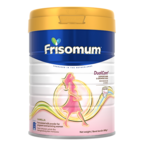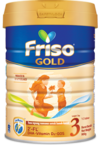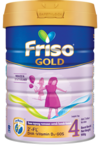Apakah susu yang paling sesuai untuk ibu mengandung?
Susu untuk ibu hamil membekalkan nutrien yang penting untuk kesihatan .... read more


0:08
Hello, I'm Dr. Nicholas Lim from Columbia Asia Hospital, Petaling Jaya.
0:11
As a healthcare professional, I would suggest for mothers to drink maternal milk because it is formulated for the nutritional needs of pregnant and breastfeeding mothers.
0:22
During this delicate time, your body provides your baby with all the nutrients it needs to be healthy.
0:28
So, supplement your diet with maternal milk as it helps balance both you and your baby's nutritional needs safely.


When selecting the food and drinks to include in your diet during pregnancy, your biggest concern should be supporting both you and your child. Since milk is a common drink that you might have in the morning, the great news is it’s still possible to fit it into your diet during pregnancy! Here are the benefits of maternal milk powder for pregnancy, and other types of milk you may turn to. As always, we recommend that you consult with your doctor for advice before implementing any dietary changes.

Folic acid helps with the growth and development of the foetus and plays an important role in formation of red blood cells. As compared to normal adults, the need of folic acids in pregnant mums is higher.

Drinking maternal milk/susu can supplement the nutrients lost due to nausea and vomiting for ladies during pregnancy.
Maternal milk/susu is easily absorbed and does not add to digestion issues. It is also suitable for breastfeeding mums as it helps to meet their body’s nutritional requirements. Mums should pick a pregnancy milk/susu that best suits them, has a light taste and has balanced nutrition and fat content that is easy to absorb.
Consuming milk during pregnancy helps in lowering the risk of diseases such as multiple sclerosis, neonatal rickets, and osteoporosis
How much weight is the healthy amount to gain? Every pregnancy is different. Some mothers gain only 5 to 7kg whilst others gain up to 20kg throughout their pregnancy period. A good rule to follow during pregnancy is that if the mother is overweight at the beginning of pregnancy, her weight gain should be less than the weight of a person with a regular BMI. A woman who is at an average weight in the beginning of her pregnancy can gain between 10-15kg, whereas an overweight woman should only gain 5-7kg. Consuming maternal milk can allow you to reach your calorie as well as nutritional intake. 3
Maternal milk is an important source of calcium and vitamin D for women during pregnancy. Getting enough Vitamin D during pregnancy can reduce the risk of the child developing allergies in the future. Pregnant women also need between 1000mg to 1300mg of calcium every day for the nourishment of their bodies and the growth of their child. Milk intake during pregnancy can meet some of your calcium needs. You can take calcium supplements recommended by your doctor and practice drinking milk daily to achieve the required calcium requirements. 2
Consuming maternal milk during pregnancy can also promote growth for your little bundle of joy. Children can also develop high levels of insulin in their blood later on in life. This lowers the risk for type 2 diabetes. 1
Many mums-to-be are asking whether cow's milk is a safe choice during pregnancy, which milk powder is good for pregnancy and what alternatives to turn to if you can’t drink regular whole milk. Read on to find out:
There are many benefits of drinking cow's milk during pregnancy. Whole milk from cows is a healthy source of protein and many essential minerals such as calcium, vitamin D, vitamin B and even fats that both your body and developing child need. In most cases, a few servings of milk can be safely included in your daily pregnancy diet.
However, drinking cow’s milk during pregnancy is not always an option. Many women find that their stomachs can't tolerate milk very well, even if they had no issues with digesting milk before. Lactose—the naturally occurring sugar found in both pasteurised and raw milk—is often the culprit behind your body rejecting it. In this situation, you may need to look for milk alternatives that provide all the nutrition without the sensitivity issues associated with whole milk.
If you find yourself sensitive to whole milk during your pregnancy, you can look to plant-based milk products such as almond milk and soy milk as an alternative option. These products are naturally lactose-free, eliminating the risk of digestion issues associated with lactose. Often fortified with protein and minerals, they can help you consume the necessary amounts of calcium and vitamins.
Remember to look for healthier versions such as unsweetened almond milk. While pregnant mums do need to consume more calories during pregnancy, it is better if they come from whole food sources, not empty calories often found in the sweetened or high-fat products.
No matter which milk alternative you choose, please make sure that you consume plenty of water during your pregnancy. Getting into the habit of drinking a glass every morning is not only one of the best habits for your body and health, but it is also important for your child.
To address the specific needs of mums-to-be, maternal milk is often recommended as it helps balance both your and your toddler’s nutritional needs safely. We have formulated Friso® Gold Mum with both mum and child in mind, and its unique Dual Care+ formula supports you on your pregnancy journey.
If you're wondering what is the best time to consume milk during pregnancy, take note that you can begin as soon as you learn of your pregnancy. Consuming the right amount of calcium and other minerals to support you during and after pregnancy can be challenging, so we have included a healthy amount in Friso® Gold Mum to support your physiological changes during pregnancy. Friso® Gold Mum isn’t just milk for pregnant women, it also provides a good foundation for your ever-growing toddler. In fact, some of the vital nutrients that Friso® Gold Mum provides you with include:
Vitamin B12 – Needed for red blood cell production and the healthy functioning of the nervous system.
Folic Acid – Folic acid is essential for growth and division of cells. Folate plays a role in the formation of red blood cells. Folate helps to maintain the growth and development of the foetus.
Iodine – Essential for the formation of thyroid hormones, which supports brain development.
Vitamin D –Vitamin D is necessary for the absorption and utilisation of calcium and phosphorus.
Calcium – Helps in the normal growth and development of bones and teeth.
Low glycemic index – The glycaemic index (GI) is a rating system for foods containing carbohydrates. It shows how quickly food affects your blood sugar (glucose) level when eaten on its own. The low glycemic index (GI) could help the mother avoid being overweight during pregnancy.
The less fluids a pregnant woman receives, the higher the chances that she could suffer from water retention. When a pregnant woman is well and sufficiently hydrated, her chances of suffering from water retention reduces. Not only will three glasses of maternal milk a day provide the essential nutrients required for both mother and her child, but it also supplements fluid requirements during pregnancy. 4
Besides understanding the types of milk pregnant mums may need, another important thing to factor in during pregnancies is your food intake. You may hear a lot about what you have to consume for your child's growth. However, there are foods you need to know to avoid to prevent any complications to your pregnancy. Learn more!
When you consider milk for pregnant women, also consider the origins of the milk and the process of manufacturing. Friso® Gold Mum undergoes a single manufacturing process, so it preserves the natural nutrients of the milk to give you what you need in your pregnancy journey. Now that you are aware of the importance of maternal milk/susu, check out what Friso® Gold Mum has to offer now!


